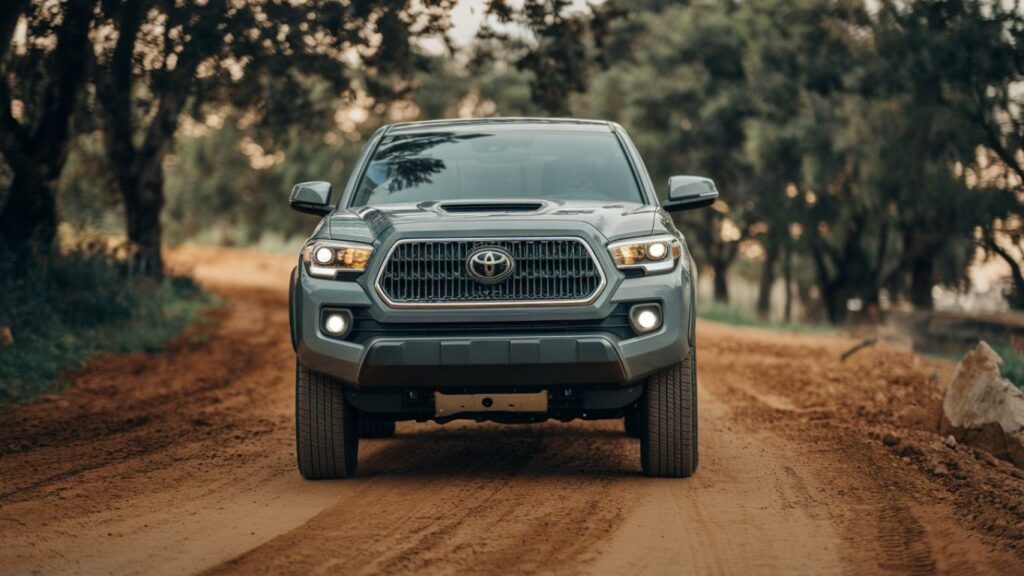The Ultimate Guide to Toyota Tacoma Fuel Economy: MPG, Efficiency Tips, and Comparisons

Introduction
The Toyota Tacoma is one of the most popular midsize pickup trucks, known for its durability, off-road capabilities, and reliability. However, when it comes to fuel efficiency, many potential buyers and current owners wonder how well it performs. If you’re searching for information on Toyota Tacoma fuel economy, you’re in the right place.
In this comprehensive guide, we’ll break down Toyota Tacoma fuel economy across different model years, discuss factors that affect its efficiency, compare it with competitors, and provide tips on how to maximize mileage. Whether you own a Tacoma or are considering buying one, this guide will help you make an informed decision.
Toyota Tacoma Fuel Economy Overview

What to Expect from the Toyota Tacoma’s Fuel Economy?
The Toyota Tacoma fuel economy varies depending on the engine, drivetrain, and transmission type. Recent models are available with a 2.7L inline-4 engine or a 3.5L V6 engine, each offering different fuel efficiency levels.
The 2.7L four-cylinder engine is generally more fuel-efficient but lacks the power needed for towing and heavy loads. On the other hand, the 3.5L V6 engine provides more power but consumes slightly more fuel. Rear-wheel drive (RWD) models typically achieve better mileage than four-wheel drive (4WD) models because of reduced weight and drivetrain complexity.
2024 Toyota Tacoma Fuel Economy
The 2024 Toyota Tacoma continues the tradition of offering a balance between power and fuel efficiency. The estimated Toyota Tacoma fuel economy for different configurations is:
- 2.7L I4 (RWD, Automatic) – 20 mpg city / 23 mpg highway / 21 mpg combined
- 3.5L V6 (RWD, Automatic) – 19 mpg city / 24 mpg highway / 21 mpg combined
- 3.5L V6 (4WD, Manual) – 17 mpg city / 21 mpg highway / 18 mpg combined
- 3.5L V6 (4WD, Automatic) – 18 mpg city / 22 mpg highway / 20 mpg combined
These fuel economy ratings make the Tacoma a competitive choice for midsize truck buyers who need a balance of power and efficiency. While it may not be the most fuel-efficient truck in its class, it provides a reliable option for both city and off-road driving.
Toyota Tacoma Fuel Economy by Model Year
2023 Toyota Tacoma Fuel Economy
- 2.7L I4 (RWD, Automatic) – 20 mpg city / 23 mpg highway / 21 mpg combined
- 3.5L V6 (4WD, Automatic) – 18 mpg city / 22 mpg highway / 20 mpg combined
The 2023 Tacoma retains similar fuel efficiency figures to the 2024 model. While the performance remains steady, slight engineering tweaks have helped improve overall drivability.
2022 Toyota Tacoma Fuel Economy
- TRD Sport 3.5L V6 (4WD, Automatic) – 18 mpg city / 22 mpg highway / 20 mpg combined
- TRD Off-Road 3.5L V6 (4WD, Manual) – 17 mpg city / 20 mpg highway / 18.5 mpg combined
Over the years, the Toyota Tacoma fuel economy has remained relatively stable, with slight improvements in aerodynamics and engine efficiency enhancing mileage. However, these numbers highlight that fuel economy largely depends on the engine and drivetrain selection.
Factors Affecting Toyota Tacoma Fuel Economy

Engine Type and Drivetrain
The engine type is one of the most significant factors affecting the Toyota Tacoma fuel economy. The four-cylinder engine is more fuel-efficient but sacrifices power, whereas the V6 offers better performance at the cost of slightly lower mpg.
Similarly, RWD models provide better mileage than 4WD models due to reduced weight and drivetrain complexity. Those who prioritize efficiency over off-road capabilities might opt for the RWD Tacoma to get the best fuel economy.
Transmission Type
Transmission choice also plays a key role in fuel efficiency. Automatic transmissions tend to be more fuel-efficient than manual ones due to optimized gear ratios. The 6-speed automatic transmission found in modern Tacomas allows for smoother shifting and better fuel economy compared to older models.
Driving Conditions
City driving leads to higher fuel consumption due to frequent stops and starts. In contrast, highway driving results in better fuel economy because of steady speeds and lower engine strain. Drivers who frequently navigate urban environments may see lower mpg compared to those who primarily use highways.
Payload and Towing Capacity
Carrying heavy cargo or towing a trailer reduces Toyota Tacoma fuel economy, as the engine works harder to move the extra weight. If fuel efficiency is a priority, reducing excess weight in the truck bed and limiting towing when not necessary can improve overall mpg.
How to Improve Your Toyota Tacoma Fuel Economy
To maximize your Toyota Tacoma fuel economy, consider implementing the following strategies:
Drive Smoothly
Avoid sudden acceleration and hard braking, as they increase fuel consumption. Instead, drive at a steady pace and anticipate stops ahead of time to improve efficiency.
Maintain Proper Tire Pressure
Under-inflated tires create more rolling resistance, leading to lower mpg. Checking and maintaining proper tire pressure regularly can lead to noticeable fuel savings.
Reduce Unnecessary Weight
Removing unneeded items from your truck bed can improve fuel efficiency. Excess weight forces the engine to work harder, increasing fuel consumption.
Use the Right Fuel Type
While the Tacoma runs on regular unleaded gas, using high-quality fuel from reputable stations ensures better engine performance and longevity.
Keep Up with Routine Maintenance
Regular oil changes, air filter replacements, and spark plug checks contribute to optimal fuel efficiency. A well-maintained engine runs more efficiently and consumes less fuel.
Toyota Tacoma vs. Competitors in Fuel Economy

How does the Toyota Tacoma fuel economy compare to other midsize trucks?
The Tacoma offers competitive fuel economy, though some rivals, like the Ford Ranger and Chevrolet Colorado, perform slightly better in mpg ratings. However, the Tacoma makes up for this with its long-term reliability and rugged off-road capabilities.
Frequently Asked Questions (FAQs)
What is the most fuel-efficient Toyota Tacoma model?
The 2.7L I4 (RWD, Automatic) version provides the best fuel efficiency, offering 20 mpg city / 23 mpg highway / 21 mpg combined.
Does the Toyota Tacoma have a hybrid version?
As of 2024, Toyota has not introduced a hybrid Tacoma, but future models may incorporate hybrid or electric technology.
Is the Toyota Tacoma good on gas compared to other trucks?
Yes, while not the most fuel-efficient in its class, the Tacoma provides decent mileage, especially considering its off-road capabilities.
Can driving habits affect fuel economy?
Yes, aggressive driving, excessive idling, and carrying extra weight all negatively impact Toyota Tacoma fuel economy.
What gas does the Toyota Tacoma require?
The Tacoma runs on regular unleaded gasoline. Using premium fuel is unnecessary.
Conclusion
The Toyota Tacoma fuel economy is a crucial factor for potential buyers and current owners looking to manage fuel costs while enjoying a powerful and reliable midsize truck. With an average fuel efficiency ranging between 17-24 mpg, depending on engine and drivetrain choices, the Tacoma balances performance and practicality.
By following best practices such as smooth driving, proper maintenance, and weight reduction, owners can maximize their Tacoma’s fuel efficiency. When compared to competitors, the Tacoma holds its ground, especially with its durability and off-road prowess.
Whether you’re looking for a daily driver, an off-road beast, or a towing vehicle, the Toyota Tacoma remains a top contender in the midsize truck segment. If fuel efficiency is a priority, opt for the 2.7L I4 RWD model for the best mileage.
Looking for more insights on the Toyota Tacoma fuel economy? Keep following our blog for the latest updates and expert advice!
CLICK FOR MORE INFORMATION Dailynewsbizz.com




